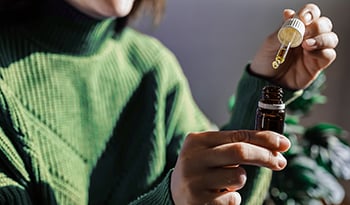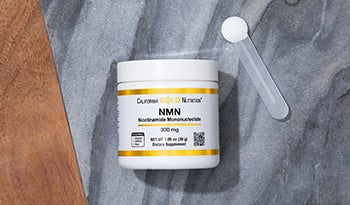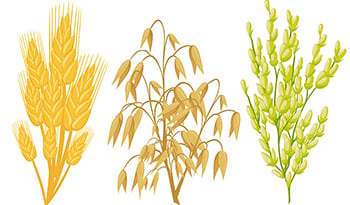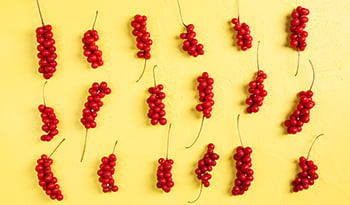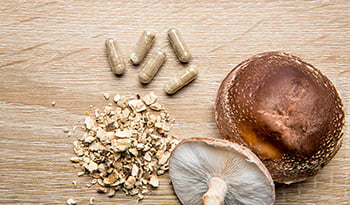L-茶氨酸,健康益處與認知功能

氨基酸L-茶氨酸(γ-N-乙基谷氨酰胺),天然存在於茶葉和食用褐絨蓋牛肝菌(學名:Xerocomus badius)中。綠茶和紅茶來自相同的植物。紅茶是通過發酵製成的,而綠茶沒有經過發酵。綠茶已經成為中藥的主要支柱超過三千年,人們將其與其他草藥一起作為藥劑,也將其作為濃縮液單獨使用,旨在增強耐力和集中註意力。L-茶氨酸的含量取決於茶樹的生長地點、製作方法和收穫時間。不同種類的茶如普洱茶比更為大眾所熟知的山茶的L-茶氨酸的含量要高。也有合成形式的L-茶氨酸(Suntheanine™)。
L-茶氨酸在亞洲國家被廣泛用於對抗各種醫學和心理健康問題,並且在西方國家迅速普及。咖啡因是茶中的另一種主要成分,可能提高大腦中乙酰膽鹼和多巴胺的水平,從而可能改善注意力、認知和情緒。就認知益處而言,咖啡因比L-茶氨酸的效果更快,因為它被更快地吸收,在30分鐘後達到血漿峰值水平,與攝入L-茶氨酸50分鐘後的血漿峰值水平相比。除了茶氨酸和咖啡因外,茶葉還含有其他成分,可能帶來各種健康益處,包括氨基酸 谷氨酰胺、精氨酸、絲氨酸和丙氨酸和酚類化合物表沒食子兒茶素、表兒茶素沒食子酸酯、表兒茶素和表沒食子兒茶素沒食子酸酯(所謂的'兒茶素')。抹茶是一種特殊的綠茶產品,與普通綠茶相比含有更高水平的有益植物化學物質。
動物和人類研究顯示L-茶氨酸可能減少主觀的壓力反應、提高認知能力、優化睡眠,並可能對慢性疾病、心血管疾病、肥胖和普通傷風具有保護作用。包括L-茶氨酸、咖啡因和兒茶素在內的各種綠茶成分可能有助於預防代謝綜合徵和肥胖症。L-茶氨酸可能減少由活性氧類物質(即“自由基”)引起的氧化損傷,增加肝臟中的穀胱甘肽濃度,增強肝酶如超氧化物歧化酶清除血液中的毒素的能力。研究結果表明,L-茶氨酸可能具有延緩衰老的功效。來自綠茶的兒茶素可能具有有益的抗微生物和防病毒活性。在胃腸道中,綠茶已被證實可能激活細胞內的防氧化劑並阻抑前致癌物的形成。
L-茶氨酸和神經精神疾病
L-茶氨酸已被證實可能改善學習、記憶和認知功能,並增強精神任務中的選擇性注意力。流行病學研究顯示經常食用由山茶樹葉製成的茶,可能與認知下降的發生率降低、情緒改善和應對壓力的能力增強有關。L-茶氨酸可能是一種富有前景的精神分裂症增強療法,可能對情緒障礙、注意力缺陷多動障礙(ADHD)以及恐慌症、強迫症(OCD)和雙相情感障礙有益。
安慰劑對照研究已經研究了L-茶氨酸單獨或與咖啡因結合使用對情緒和認知表現的影響,發現認知功能在綜合療法中可能有所增強,但對單獨使用L-茶氨酸沒有反應。兩項關於茶成分對急性精神病在情緒和認知方面的影響的薈萃分析發現,L-茶氨酸可能改善了自我感覺的放鬆、減少了主觀的緊張感,並且咖啡因可能改善了要求的認知任務的表現,並可能提高了警覺性和活力。
動物研究顯示L-茶氨酸可能迅速穿過血腦屏障,提高大腦中血清素、γ-氨基丁酸和多巴胺的水平,與穀氨酸和NMDA受體結合,並可能增加腦源性神經營養因子(BDNF)的水平。長期服用L-茶氨酸(即超過3至4週)可能具有一般的神經保護作用,這可能是由海馬體(在記憶鞏固中發揮核心作用的大腦區域)中腦源性神經營養因子(BDNF)合成增加所引起的。所有這些影響都被認為可能緩解焦慮。
由於L-茶氨酸通常與咖啡因和茶中的其他生物活性成分一起攝入,大多數研究調查了L-茶氨酸和咖啡因對情緒和認知的綜合影響。
L-茶氨酸,焦慮和壓力
L-茶氨酸的抗焦慮效果是通過不同的機制介導的,包括提升α-腦波活動,增加γ-氨基丁酸的合成,以及它作為AMPA谷氨酸受體的弱拮抗劑的作用。L-茶氨酸的一般鎮定益處反映在α頻率範圍(8至13Hz)內的腦電活動增加。通過腦電圖(EEG)測量的腦電活動的變化是劑量依賴性的,並且類似於在冥想中觀察到的有益的EEG變化,包括在枕骨和頂葉區域中增加的α波。在給予200毫克劑量的L-茶氨酸後,顯示增加的α活性可能持續60分鐘,並且這種效果在具有更高特質焦慮的個體中更顯著。終末,研究發現,攝入高L-茶氨酸含量的綠茶可能緩解暴露於慢性應激的小鼠的腎上腺肥大。
根據特定種類的茶葉中的L-茶氨酸和咖啡因的相對含量及其製備方法,飲用綠茶以減輕壓力或焦慮的個體可能會比刺激作用產生更大的鎮定效果。在服用50至200毫克劑量的L-茶氨酸後30至40分鐘內,通常可能會注意到一般的鎮定作用,並且通常持續8至10小時。中度焦慮性神經症通常每天服用一次或兩次,每次200毫克後產生效果。更嚴重的焦慮可能需要每天600毫克至800毫克的劑量,在一天中以100毫克至200毫克的間隔增量服用。與苯二氮卓類和其他醫生開具的抗焦慮藥劑不同,L-茶氨酸可能不會引起嗜睡、反應遲鈍或註意力不集中,可能不存在產生耐受性或依賴性的風險。暫無L-茶氨酸和精神藥劑或其他天然產物之間嚴重不良副作用或相互作用的相關報告。
關於狀態焦慮的L-茶氨酸的研究結果可能有所差異。結果的差異可能與檢查的不同患者群體有關,並且一些研究調查了咖啡因與L-茶氨酸的組合。安慰劑對照試驗將L-茶氨酸200毫克/天與苯二氮卓類阿普唑侖進行比較,可能發現了一般抗焦慮作用的證據,但無法緩解實驗誘導的狀態焦慮。相比之下,另外兩項研究報告指出,針對相同劑量L-茶氨酸的反應,主觀壓力測量值可能顯著降低,例如心率和血壓降低。在一項為期4週的安慰劑對照試驗(N=30)中,與安慰劑組相比,沒有精神疾病的成年人隨機接受200毫克/天的L-茶氨酸的狀態焦慮可能有所緩解並且睡眠改善可能明顯更多。在一項小型安慰劑對照試驗中,16名健康成年志願者隨機分為L-茶氨酸200毫克/天、阿普唑侖1毫克或安慰劑,同時在放鬆和實驗誘導的急性焦慮情況下進行監測。L-茶氨酸在基線條件下可能具有一些放鬆作用,但在放鬆狀態或實驗誘導的焦慮狀態期間,阿普唑侖和L-茶氨酸可能皆沒有比安慰劑表現出更大的抗焦慮作用。
在一項為期10週的安慰劑對照研究中(N=46),DSM-5診斷為廣泛性焦慮性神經症的成年人隨機接受L-茶氨酸(450至900毫克/天)或安慰劑,同時繼續他們目前的藥劑療法。輔助性L-茶氨酸組在降低焦慮或優化睡眠方面的表現可能並不優於安慰劑組。在一項小型安慰劑對照研究(N=34)中,18-40歲的健康成人被給予L-茶氨酸飲料或安慰劑,然後進行多任務認知應激源。服用飲料1小時後,與安慰劑組相比,L-茶氨酸組報告的應激反應可能顯著地降低。另一項關於含有L-茶氨酸200毫克、磷脂酰絲氨酸1毫克、洋甘菊10毫克和甘油磷酸膽鹼25毫克的營養飲料的研究發現,攝入後1小時主觀應激反應可能顯著地降低,攝入後3小時血清皮質醇水平可能顯著地降低。
L-茶氨酸和其他精神疾病
一項安慰劑對照研究發現,每日兩次服用L-茶氨酸100毫克可能顯著地改善ADHD男孩的睡眠質量,意味著L-茶氨酸可能是ADHD的有效輔助療法。L-茶氨酸不會引起嗜睡,但在睡前服用200毫克L-茶氨酸可能通過緩解焦慮來優化睡眠。
新興研究結果支持L-茶氨酸可能對抑鬱情緒和精神病的症狀有益。在一項為期8週的開放性研究(N=20)中,被診斷患有重度抑鬱症的成年人使用L-茶氨酸250毫克/天的療法,報告情緒、焦慮和睡眠質量可能有所改善。
L-茶氨酸也可能對與精神病有關的焦慮產生有益的作用。一項為期8週的安慰劑對照試驗的結果表明,增加精神分裂症和分裂情感障礙患者的L-茶氨酸劑量可能降低焦慮水平。在該群體中增加L-茶氨酸劑量的有益效果可能通過皮質醇和腦源性神經營養因子(BDNF)的增加來介導。含有神經甾體孕烯醇酮和氨基酸L-茶氨酸的組合療法可能對精神病症狀有益。為期8週的雙盲安慰劑對照試驗(N=40)中,在成人精神分裂症或分裂情感障礙對抗精神病藥反應不佳時,隨機分為孕烯醇酮(50毫克/天)加L-茶氨酸(400毫克/天)或安慰劑,同時繼續服用抗精神病藥劑。在研究結束時,與安慰劑組相比,使用孕烯醇酮加L-茶氨酸療法的患者的精神病陰性症狀可能明顯減少,如遲鈍情緒、快感缺乏和言語缺乏、焦慮顯著減少,以及一般功能可能得到更多的改善。
L-茶氨酸腦血管疾病和中風
動物研究的結果顯示,L-茶氨酸可能有助於預防腦血管疾病並減輕腦血管意外(即中風)的影響。短暫性腦缺血後L-茶氨酸的神經保護作用可能與其作為AMPA谷氨酸受體拮抗劑的作用有關。在經歷實驗誘導的重複發作的腦缺血之前使用L-茶氨酸(0.3至1毫克/千克)處理的大鼠可能表現出空間記憶障礙的顯著減少和神經細胞衰亡的顯著減少。
參考:
- Bond, A.; Lader, M. The use of analogue scales in rating subjective feelings.Br.J. Med.Psychol. 1974, 47, 211–218.
- Boros, K., N. Jedlinszki and D. Csupor, 2016.Theanine and caffeine content of infusions prepared from commercial tea samples.Theanine and caffeine content of infusions prepared from commercial tea samples.Pharmacog.Mag., 12:75-79.
- Camfield DA, Stough C, Farrimond J, Scholey AB. (2014) Acute effects of tea constituents L-theanine, caffeine, and epigallocatechin gallate on cognitive function and mood: a systematic review and meta-analysis.Nutr Rev.;72(8):507-22.
- Chu, DC, 1997.Green Tea-Its Cultivation, Processing of the Leaves for Drinking Materials and Kinds of Green Tea.In:Chemistry and Applications of Green Tea, Yamamoto, T., JR Lekh, DC Chu and M. Kim (Eds.)., CRC Press, Boca Raton, pp:1-11.
- Culetu, A., B. Fernandez-Gomez, M. Ullate, MD del Castillo and W. Andlauer, 2016.Effect of theanine and polyphenols enriched fractions from decaffeinated tea dust on the formation of Maillard reaction products and sensory attributes of breads.Food Chem., 197:14-23.
- Dietz C, Dekker M. (2017) Effect of Green Tea Phytochemicals on Mood and Cognition.Curr Pharm Des. 2017;23(19):2876-2905.
- Egashira N, Ishigami N, Pu F, Mishima K, Iwasaki K, Orito K, Oishi R, Fujiwara M. (2008) Theanine prevents memory impairment induced by repeated cerebral ischemia in rats.Phytother Res. 2008 Jan;22(1):65-8.
- Einöther SJ, Giesbrecht T. (2013) Caffeine as an attention enhancer: reviewing existing assumptions.Psychopharmacology (Berl). 2013 Jan;225(2):251-74.
- Einother, SJ; Martens, VE Acute effects of tea consumption on attention and mood.Am.J. Clin.Nutr. 2013, 98, 1700S–1708S.
- Gong, Y., Y. Luo, JA Huang, J. Zhang, Y. Peng, Z. Liu and Z. Baolu, (2012).Theanine improves stress resistance inCaenorhabditis elegans.J. Funct.Foods, 4:988-993.
- Haskell, CF; Dodd, FL; Wightman, EL; Kennedy, DO (2013) Behavioural effects of compounds co-consumed in dietary forms of caffeinated plants.Nutr.Res.Rev., 26, 49–70.
- Haskell, CF; Kennedy, DO; Milne, AL; Wesnes, KA; Scholey, AB (2008) The effects of L-theanine, caffeine and their combination on cognition and mood.Biol.Psychol. 2008, 77, 113–122.
- Heiss, ML and RJ Heiss, 2008.The Story of Tea:A Cultural History and Drinking Guide.Ten Speed Press, Berkeley, CA/Toronto, Canada.
- Hidese S, Ota M, Wakabayashi C, Noda T, Ozawa H, Okubo T, Kunugi H. Effects of chronic l-theanine administration in patients with major depressive disorder: an open-label study.Acta Neuropsychiatr. 2017 Apr;29(2):72-79.
- Higashiyama A, Htay HH, Ozeki M, et al. (2011) Effects of l-theanine on attention and reaction time response.J Funct Foods.;3:171–178.
- Higashiyama, A., HH Htay, M. Ozeki, LR Juneja and MP Kapoor, 2011.Effects of L-theanine on attention and reaction time response.J. Funct.Foods, 3:171-178.
- Hintikka J, Tolmunen T, Honkalampi K, et al. (2005) Daily tea drinking is associated with a low level of depressive symptoms in the Finnish general population.Eur J Epidemiol.;20:359–363.
- Hiroshi Kunugi, Shinsuke Hidese, Shintaro Ogawa, Miho Ota, Zenta Yasukawa, and Makoto Ozeki (2019) Effects of Chronic L-theanine on Stress-related Symptoms and Cognitive Function in a Non-clinical Population:A Randomized Controlled Trial (P06-106-19) Curr Dev Nutr. 13;3(Suppl 1). pii: nzz031.P06-106-19.
- Hozawa A, Kuriyama S, Nakaya N, et al. (2009) Green tea consumption is associated with lower psychological distress in a general population: the Ohsaki Cohort 2006 Study.Am J Clin Nutr. 2009; 90:1390–1396.
- Ikeda, I. (2008) Multifunctional effects of green tea catechins on prevention of the metabolic syndrome.Asia Pac J Clin Nutr. 2008;17 Suppl 1:273-4.
- Ito, K.; Nagato, Y.; Aoi, N.; Juneja, LR; Kim, M.; Yamamoto, H.; Sugimoto, S. (1998) Effects of L-theanine on the release of alpha-brain waves in human volunteers.Nippon N¯ogei Kagakukaishi, 72, 153–157.
- Jang, SI, MH Jun, HS Lillehoj, RA Dalloul, IK Kong, S. Kim and W. Min, 2007.Anticoccidial effect of green tea-based diets againstEimeria maxima.Vet.Parasitol., 144:172-175.
- Juneja, L. R., Chu, D.-C., Okubo, T., et al. (1999).L-theanine, a unique amino acid of green tea, and its relaxation effect in humans.Trends in Food Science Technology, 10, 199–204.
- Kakuda, T. (2002) Neuroprotective effects of the green tea components theanine and catechins.Biol Pharm Bull. 2002 Dec;25(12):1513-8.
- Kakuda, T. (2011) Neuroprotective effects of theanine and its preventive effects on cognitive dysfunction.Pharmacol Res. 2011 Aug;64(2):162-8.
- Kakuda, T., Nozawa, A., Unno, T., et al. (2000).Inhibiting effects of theanine on caffeine stimulation evaluated by EEG in the rat.Bioscience Biotechnology Biochemistry, 64, 287–293.
- Kakuda, T.; Nozawa, A.; Sugimoto, A.; Niino, H. (2002) Inhibition by theanine of binding of [3H] AMPA, [3H] kainate, and [3H] MDL 105,519 to glutamate receptors.Biosci.Biotechnol.Biochem., 66, 2683–2686.
- Kardashev A, Ratner Y, Ritsner MS. (2018) Add-On Pregnenolone with L-Theanine to Antipsychotic Therapy Relieves Negative and Anxiety Symptoms of Schizophrenia:An 8-Week, Randomized, Double-Blind, Placebo-Controlled Trial.Clin Schizophr Relat Psychoses.;12(1):31-41.
- Kimura K, Ozeki M, Juneja LR, et al. (2007) L-Theanine reduces psychological and physiological stress responses.Biol Psychol.;74:39–45.
- Koo, M., Cho, C. (2004) Pharmacological effects of green tea on the gastrointestinal system.Eur J Pharmacol. 2004 Oct 1;500(1-3):177-85.
- Lardner, A., (2014) Neurobiological effects of the green tea constituent theanine and its potential role in the treatment of psychiatric and neurodegenerative disorders.Nutr Neurosci. 2014 Jul;17(4):145-55.
- Li, G., Y. Ye, J. Kang, X. Yao and Y. Zhanget al.,( 2012).L-Theanine prevents alcoholic liver injury through enhancing the antioxidant capability of hepatocytes.Food Chem.Toxicol., 50:363-372.
- Li, L., XR Wang, Y. Xiong, WK Ren and M. Huanget al., 2013.L-theanine:A promising substance in tumor research.J. Food Agric.Environ., 11:25-27.
- Lu K, Gray MA, Oliver C, Liley DT, Harrison BJ, Bartholomeusz CF, Phan KL, Nathan PJ. (2004) The acute effects of L-theanine in comparison with alprazolam on anticipatory anxiety in humans.Hum Psychopharmacol.;19(7):457-65.
- Lyon MR, Kapoor MP, Juneja LR. (2011) The effects of L-theanine (Suntheanine®) on objective sleep quality in boys with attention deficit hyperactivity disorder (ADHD): a randomized, double-blind, placebo-controlled clinical trial.Altern Med Rev. 2011 Dec;16(4):348-54.
- Mason, R. (2001). 200 mg of Zen:L-theanine boosts alpha waves, promotes alert relaxation.Alternative and Complementary Therapies, 7, 91–95.
- Miodownik C, Maayan R, Ratner Y, Lerner V, Pintov L, Mar M, Weizman A, Ritsner MS. (2011) Serum levels of brain-derived neurotrophic factor and cortisol to sulfate of dehydroepiandrosterone molar ratio associated with clinical response to L-theanine as augmentation of antipsychotic therapy in schizophrenia and schizoaffective disorder patients.Clin Neuropharmacol. 2011 Jul-Aug;34(4):155-60.
- Muhammad Saeed, Mohamed Ezzat Abd El-Hack, Mahmoud Alagawany, et al. (2017) Review Article Phytochemistry, Modes of Action and Beneficial Health Applications of Green Tea (Camellia sinensis) in Humans and Animals, International Journal of Pharmacology 13(7):698-708
- Nathan PJ, Lu K, Gray M, Oliver C. (2006) The neuropharmacology of L-theanine(N-ethyl-L-glutamine): a possible neuroprotective and cognitive enhancing agent.J Herb Pharmacother. 2006;6(2):21-30.
- Rao TP, Ozeki M, Juneja LR. (2015) In Search of a Safe Natural Sleep Aid.J Am Coll Nutr. 2015;34(5):436-47.
- Rogers PJ, Smith JE, Heatherley SV, et al. (2008) Time for tea: mood, blood pressure and cognitive performance effects of caffeine and theanine administered alone and together.Psychopharmacology (Berl).;195:569–577.
- Saito, K., M. Ikeda and H. Kametani, 2011.Theanine in the tea roots attenuates memory deficits in the aged rats.Free Radical Biol.Med., Vol. 51.
- Sarris J, Byrne GJ, Cribb L, Oliver G, Murphy J, Macdonald P, Nazareth S, Karamacoska D, Galea S, Short A, Ee C, Birling Y, Menon R, Ng CH. (2019) L-theanine in the adjunctive treatment of generalized anxiety disorder:A double-blind, randomised, placebo-controlled trial, J Psychiatr Res.;110:31-37.
- Shacham, S. (1983) A shortened version of the Profile of Mood States.J. Pers.Assess., 47, 305–306.
- Shen, H., X. Shen, R. Wang and M. Wu, 2011.Effects of theanine on cerebral ischemia-reperfusion injury in rats.J. Hygiene Res., 40:684-687.
- Song JM, Seong BL. (2007) Tea catechins as a potential alternative anti-infectious agent.Expert Rev Anti Infect Ther. 2007 Jun;5(3):497-506.
- Song, HJ, YD Kim, MJ Jeong, MS Ahn, SW Kim, JR Liu and MS Choi, 2015.Rapid selection of theanine-rich green tea (Camellia sinensisL.) trees and metabolites profiling by Fourier transform near-infrared (FT-IR) spectroscopy.Plant Biotechnol.Rep., 9:55-65.
- Tamano, H.; Fukura, K.; Suzuki, M.; Sakamoto, K.; Yokogoshi, H. (2014) Takeda, A. Advantageous effect of theanine intake on cognition.Nutr.Neurosci., 17, 279–283.
- Thangarajan, S., A. Deivasigamani, SS Natarajan, P. Krishnan and SK Mohanan, 2014.Neuroprotective activity of L-theanine on 3-nitropropionic acid-induced neurotoxicity in rat striatum.Int.J. Neurosci., 124:673-684.
- Türközü D, Şanlier N. (2017) L-theanine, unique amino acid of tea, and its metabolism, health effects, and safety.Crit Rev Food Sci Nutr. 24;57(8):1681-1687.
- Unno K, Hara A, Nakagawa A, Iguchi K, Ohshio M, Morita A, Nakamura Y. (2016) Anti-stress effects of drinking green tea with lowered caffeine and enriched theanine, epigallocatechin and arginine on psychosocial stress induced adrenal hypertrophy in mice.Phytomedicine. 2016 Nov 15;23(12):1365-1374.
- Van der Pijl PC, Chen L, Mulder TPJ. (2010) Human disposition of L-theanine in tea or aqueous solution.J Funct Foods.;2:239–244.
- Vuong, QV, MC Bowyer and PD Roach, 2011.L-Theanine:Properties, synthesis and isolation from tea.J. Sci.Food Agric., 91:1931-1939.
- Wakabayashi, C.; Numakawa, T.; Ninomiya, M.; Chiba, S.; Kunugi, H. (2012) Behavioral and molecular evidence for psychotropic effects in L-theanine.Psychopharmacology 2012, 219, 1099–1109.
- White DJ, de Klerk S, Woods W, Gondalia S, Noonan C, Scholey AB. (2016) Anti-Stress, Behavioural and Magnetoencephalography Effects of an L-Theanine-Based Nutrient Drink:A Randomised, Double-Blind, Placebo-Controlled, Crossover Trial.Nutrients. 2016 Jan 19;8(1). pii:E53.
- Zheng G, Sayama K, Okubo T, Juneja LR, Oguni I. (2004) Anti-obesity effects of three major components of green tea, catechins, caffeine and theanine, in mice.In Vivo.;18(1):55-62.
免責聲明:本健康中心不提供診斷⋯
















































































 目錄
目錄







